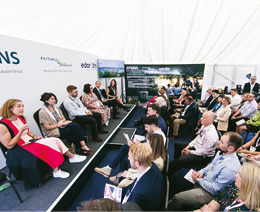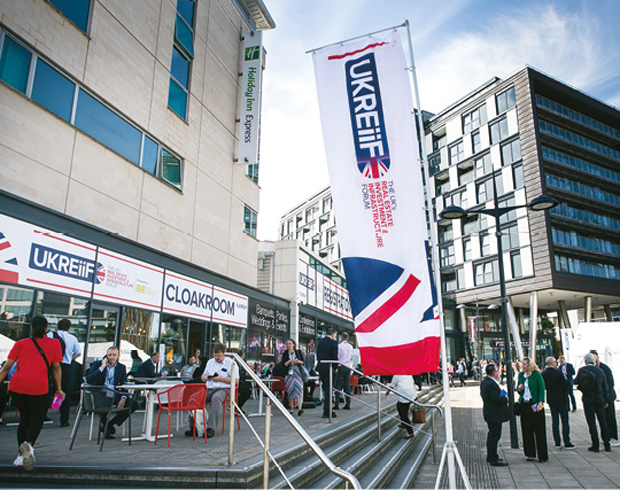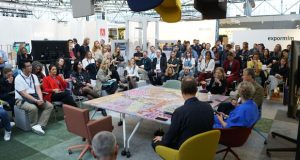In May, the UK’s Real Estate Investment and Infrastructure Forum (UKREiiF) took place in Leeds City Centre, focussing on how real estate can better connect people, places and businesses to accelerate and unlock sustainable, inclusive and transformational investment. Craig Peters, Senior Consultant at Magenta Associates reports
There wasn’t a superyacht in sight, nor were delegates basking in southern France temperatures a la MIPIM. But the sun did shine brightly on Leeds for the second annual UKREiiF. The event welcomed industry leaders to discuss the future of the UK’s property sector, its challenges and the growing need to foster collaboration between key stakeholders.
GREENER REAL ESTATE
With sustainability and technology at the core of its agenda, UKREiiF sought to find out what it would take to create a greener, more resilient, and forward-thinking real estate landscape. In one session, chaired by Nicola Haigh, Head of Real Estate at Lloyds Bank, the general consensus was that the UK is some way off where it needs to be when is comes to carbon reduction. This was voiced by Simon McWhirter, Director of Comms, Policy and Places for the UK Green Building Council. “The industry needs to take a proactive role in transforming its practices. The implementation of current government policies alone is insufficient to meet carbon reduction goals because, at the moment, we are miles off [our targets],” he said.
Establishing a unified definition of social value and ensuring consistency across the UK’s facilities management sector is crucial. In the aptly named session ‘the role of social value in the ESG landscape’, it was agreed that a whole variety of built environment stakeholders must join forces to achieve this, uniting under a shared vision, a common language, and an approach that drives measurable impact while championing the vital voice of the community.
British Land has embraced a sustainable strategy that revolves around three key pillars: green places, thriving spaces, and responsible choices. By prioritising environmental sustainability, fostering vibrant communities, and making responsible decisions, British Land is attempting to set an example for others in the industry to follow. Their approach feels like a genuine commitment to creating spaces that benefit society, both now and in the future.
Charlie MacDowall, Engagement Manager (smart places) for Monstarlab, explored the notion of work environments and their impact on employee productivity. She asked how significant the role of the workplace is now. “Does it truly matter what people are doing and the environments they are provided with?,” she put to her panel. Gartner recently conducted a study that delved into four distinct modes of working, emphasising the need for organisations to invest in each of these modes to maximise their workforce’s potential. The reality is that not everyone thrives under the same conditions, and it is crucial to acknowledge and accommodate these differences. Some individuals may excel in collaborative settings, while others may prefer solitude or require a sense of urgency to perform optimally. Recognising these varying work styles is vital. On the panel, John Nordon, Creative Director at igloo Regeneration, said a more focussed approach centred solely on the office environment is necessary, combined with a blend of different spaces that can be utilised effectively.
DRIVING DIVERSITY
It was also evident at UKREiiF that there is a clear effort to improve gender balance and diversity, particularly in mixed-gender panels, and especially compared to other similar events such as MIPIM.
Women in Architecture (WIA) held a fringe event, moderated by Professor Igea Troiani, WIA UK chair and Head of Division of Architecture at London South Bank University. The event explored how to create inclusive conversations and spaces for women in real estate and construction events, particularly the large and high-level industry ones. Some suggestions included reduced-price tickets, reduced hours, or price incentives to companies bringing in a mixed team.
On the suggestion around more women’s events, the consensus was that women need not be tokenistic or provided with events such as yoga lessons or planting. Instead, women enjoy and want to enjoy equal treatment, free from gender-biased assumptions or activities.
Amid this period of uncertainty, it was reassuring to hear that there are immense opportunities waiting to be seized. Oliver Shah, Associate Editor at The Sunday Times, predicted three main things that will reshape the real estate industry: changing behaviour, the green agenda, and innovation & technology. He said within his keynote speech: “The UK building stock is inefficient, many buildings are not fit for purpose. There is – or will be – too much unlettable space. There  is an opportunity for those with the will and vision (and money) to reconfigure these buildings. The UK needs an industrial strategy to drive everything from renewable and cleaner energy to the retrofit prerogative. There will many opportunities when that starts to take shape.”
is an opportunity for those with the will and vision (and money) to reconfigure these buildings. The UK needs an industrial strategy to drive everything from renewable and cleaner energy to the retrofit prerogative. There will many opportunities when that starts to take shape.”
The bottom-line: less talk, more action.





